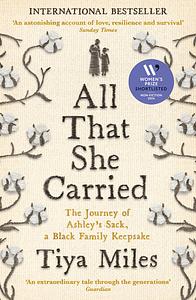Take a photo of a barcode or cover
666 reviews for:
All That She Carried: The Journey of Ashley's Sack, a Black Family Keepsake
Tiya Miles
666 reviews for:
All That She Carried: The Journey of Ashley's Sack, a Black Family Keepsake
Tiya Miles
challenging
informative
reflective
sad
slow-paced
Beautifully written and meticulously researched. A must-read for understanding more about the enduring and destructive legacy of slavery.
emotional
slow-paced
challenging
dark
emotional
informative
reflective
medium-paced
I am in awe at how this historiographical feat can at once be so transcendent and deeply grounded. Tiya Miles combines archival research and interdisciplinary theory into a breathtaking story of a seemingly ordinary object and reveals its layers of meaning across time, generations, and iterations of the United States. I am inspired to stretch myself to find as many connections as possible in my own research and remain rooted in love and reparations.
Graphic: Child death, Confinement, Death, Racial slurs, Racism, Rape, Sexual assault, Sexual violence, Slavery, Suicidal thoughts, Suicide, Violence, Medical trauma, Injury/Injury detail
challenging
dark
hopeful
informative
reflective
sad
medium-paced
As a genealogist and historian who is currently feeling helpless against political systems and other things out of my control, this book was incredibly inspiring to me. This was an important read, and a great reminder of what it means to be a good ancestor and the value of love as a form of resistance and resilience.
Graphic: Racism, Slavery
Tiya Miles is a scholar and a researcher. This book makes it clear how little we know about unfree people of color whose existence was predominately documented as numbers, ages, and sex. Names not so much. I did not know much about South Carolina and how different slave culture was in that state due to many of the slave owners had come from Barbados. Slavery in the West Indies was very cruel and this practice was continued in our south eastern states.
emotional
informative
sad
fast-paced
This was a poignant and detailed read. I am very confused by some of the other reviews saying this should’ve been an essay or that it wasn’t what was expected. The author took the sack, the items inside of it, and the stitching on the outside to paint a picture and fill in missing gaps where needed. She took known information of the time and identified the most likely scenarios that would’ve led to the creation and packing of the sack. I thought it was brilliantly done and offered another lens of the time period that I hadn’t seen before.
challenging
informative
reflective
medium-paced
I didn’t finish this book. Far too much speculation and fancy, not enough fact. The writing style is overly flowery for my taste. I was disappointed because it won the National Book Award and it’s an important subject.
Tiya Miles uses a found object, an embroidered flour sack, to chronicle a riveting history of South Carolina's plantation economy and the inhumanity it generated. She creates a vivid picture of the life of an enslaved person in Charleston. The hints given on this object touched by 3 generations of women provide the author, a gifted historian, enough information to make them real to the reader. "Rose, a visionary; Ashley, a survivor; and Ruth, a storyteller" (p. 231) Miles doesn't let Rose fade into the margins when relaying information found in plantation owners' records - the only source of information that can possibly be gleaned for glimpses of Rose.
This is a phenomenal candidate for high school summer reading lists anywhere in the country, but especially the southern states.
This is a phenomenal candidate for high school summer reading lists anywhere in the country, but especially the southern states.







